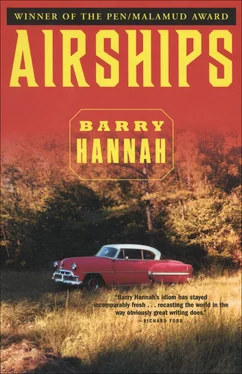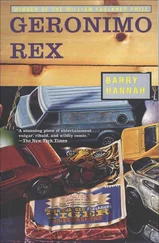“Last night you said we were your adorable vagabonds.”
“In the light of day you look more like trash. I had too much of that potato liquor you brought,” says Mrs. Neap.
I say, “Give us another chance. It might be your hangover talking. Let’s have another conference, say two o’clock. Invite down all the tenants. We’ll talk it out.”
She says, “It’s my decision. I own the place. Property is ninetenths the law,” forearm muscles standing out as she kneads the cleaning rag, one of the lenses of her spectacles cracked.
I say, “But we’re the tenth that gives existence quality, the quantum of hope and dream, of laughter, of music. Further, please, Miz Neap, we’ll clean, keep this place in shape, paint it up.”
“Where paint? What paint? It’s ten dollars a quart if you can even find it. You can’t find more than four quarts in all South and North Carolina.”
“We make our own liquor. We can find a way to make paint too. Gardiner there is close to being a bona-fide chemist.”
She says, “None of you is any good. You never brought any food into the house. Oh, that sack of onions that fell off a truck and a few blackbirds.”
I say, “How can you forget the turkey we brought when we came?”
“Sure,” says she, “that’s what you got in with, the turkey. But what since, besides potato liquor? Then you ate all the magnolias,” says she.
“ One foolish evening. Your other tenants ate some too,” say I.
“You broke the handle on the faucet.”
“Nobody ever proved it was one of us.”
“There was no fleas before you came, no cockroaches.”
“Unproven. Besides, seeing as how there’s no more turkey. .”
The house begins the shiver it does when a train is entering the curve. The train is always, beyond other concerns, an amazement. Mrs. Neap and I walk out to the warped porch to watch. The train is coming in, all right, rolling its fifteen miles an hour, and you can see the people, hundreds and hundreds, standing and sitting on the wooden platforms the company built over the cars, those pipes and chicken wire boxing in about ninety “air-riders” per car top.
Even an air-riding ticket is exorbitant, but that fifteen-mile-an-hour breeze must be nice.
The train passes three times a week. This one must’ve been carrying about five thousand in all if you were to count the between-car riders and the maintenance-ladder riders.
Resettlers.
When the bad times really came, they brought families back together, and mainly everybody started coming South. Everybody would travel back to the most prosperous member of his family, taking his own light fortune along to pool it. It healed a lot of divorces and feuds. The best thing you could have was a relative with land. You showed up at his place offering your prodigal soul and those of your family as guards of the land, pulling out your soft hands to garden up the soil and watch over it.
There are no idle murders to speak of anymore. Almost all of them are deliberate and have to do with food, water, seeds or such as a ticket on the train. For example, if I tried to jump that train Mrs. Neap and I are looking at, a man in street clothes (you’d never know which one but usually a fellow mixing with the air-riders) would shoot me in the head. The worst to come of that would be some mother would see her child see the cloud of blood flying out of my face, and she’d have to cover its mouth before it could yell because you don’t want a child making noise in a public area. Be seen and not heard applies to them, and better not even to be seen very much.
The little ones are considered emblems of felony.
When bad times first settled into reality, the radio announcers told us what conversationalists and musicians Americans were proving to be and that our natural fine wit was going to be retreasured. People began working on their communication. Tales were told. Every other guy had a harmonica, a tonette or at least was honking on two blades of grass. But that was before they started eating grass in New York and then buying up the rest of the nation’s.
On the National Radio two years ago, we heard the Surgeon General report on the studies done on survivors of lost expeditions, polar and mountaintop sorties. The thing of it was that you could stay alive a phenomenal length of time on almost nothing if you did almost nothing, counting talking and singing. Which sent communication and melody back into the crapper.
The Surgeon General said you had to be sure whatever food you were after surpassed in calories the effort getting it would burn up. Don’t run after a clump of celery, for example. Chewing celery takes more calories than eating it gives you. But cockroaches, moths and butterflies will come to you and can be caught and ingested with a bonus of calories and protein. Wash the cockroaches if possible, the Surgeon General said.
We were chewing on our rutabagas and radishes when this came out and we considered it all laughable, radical over-science for the ghettos above the Mason-Dixon.
That was in the days of cheese.
Then all the blacks started returning to the South, walking. Five thousand of them came through Maryland, eating three or four swamps around Chesapeake Bay, stripping every leaf, boiling and salting all the greenery in huge iron cauldrons they pulled along on carts.
Those blacks hit Virginia and ate a senator’s cotton plantation. People started shooting at them, and some of the nigs had guns themselves.
It was a bloodbath.
There were rumors that the blacks cooked their own dead and that you could see that’s where their strength was coming from.
When the walking poor of Chicago went through the fields of southern Illinois, over to Kansas, down through Missouri, this sort of thing was avoided. All of America knew about the Virginia horror, and steps were apparently taken among leaders to prevent its recurrence. The radio announcers urged all the walkers to spread out, don’t go in large groups. The vegetation of America would feed everybody if all the Resettlers would spread out.
This was good advice, unless you spread out on somebody’s acres.
The South was filling up with railroad people from the big defunct hives in the North. Theoretically, everybody could have his own hundred-foot-square place. But too many came back to the South. There were five million Resettlers in Atlanta, they say. Atlanta is very sorry that it prospered as a railhead. The mayor, a Puerto Rican with his Chinese wife, abdicated, leaving everything to the wardens and the stateside CIA.
Everybody is quiet. No more music or talking or needless exertion.
Crowds everywhere are immense and docile.
We hear it on the radio.
“They all look at this place covetously, those air-riders,” says Mrs. Neap. “Poor souls.”
You also had the right to kill anybody who jumped off the train into your yard. An old coroner might come by on his bicycle and stare at the body for a while, letting off a few platitudes about the old days. Like as not, a town officer, usually a nig or Vietnamese, appears and digs a hole three feet deep and prods the body over into it. This is slow going because the man will eat every worm, every grub, every spider and juicy root he upturns with his spade.
Even Mrs. Neap’s run-down house probably looks as if it has gunners at it. But it had no protection at all before we got here. I carry a knife.
The direly thin guy six and a half feet tall who melted into the dawn fog with his bow and arrow before anybody got up and returned at evening with almost all his arrows lost and not a goddamn ounce of meat to show — to be fair, four blackbirds and a rabbit smaller than the hunting arrow-wanted you to think he was Slinking Invisible itself on the borders of our landhold, when the truth was he was miles away missing ten-foot shots on trifling birds and sticking his homemade arrows into high limbs where he couldn’t retrieve them.
Читать дальше












